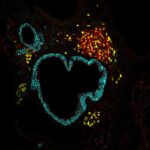
Publication: The role of natural killer cells in sepsis
Published in: Journal of Biomedicine and Biotechnology, 2011, 2011, pp.986491. ⟨10.1155/2011/986491⟩
Authors: Laurent Chiche, Jean-Marie Forel, Guillemette Thomas, Catherine Farnarier, Fréderic Vely, Mathieu Bléry, Laurent Papazian, Eric Vivier
Summary
Severe sepsis and septic shock are still deadly conditions urging to develop novel therapies. A better understanding of the complex modifications of the immune system of septic patients is needed for the development of innovative immunointerventions. Natural killer (NK) cells are characterized as CD3(-)NKp46(+)CD56(+) cells that can be cytotoxic and/or produce high amounts of cytokines such as IFN-γ. NK cells are also engaged in crosstalks with other immune cells, such as dendritic cells, macrophages, and neutrophils. During the early stage of septic shock, NK cells may play a key role in the promotion of the systemic inflammation, as suggested in mice models. Alternatively, at a later stage, NK cells-acquired dysfunction could favor nosocomial infections and mortality. Standardized biological tools defining patients’ NK cell status during the different stages of sepsis are mandatory to guide potential immuno-interventions. Herein, we review the potential role of NK cells during severe sepsis and septic shock.
Link to HAL – hal-02389494
Link to DOI – 10.1155/2011/986491

